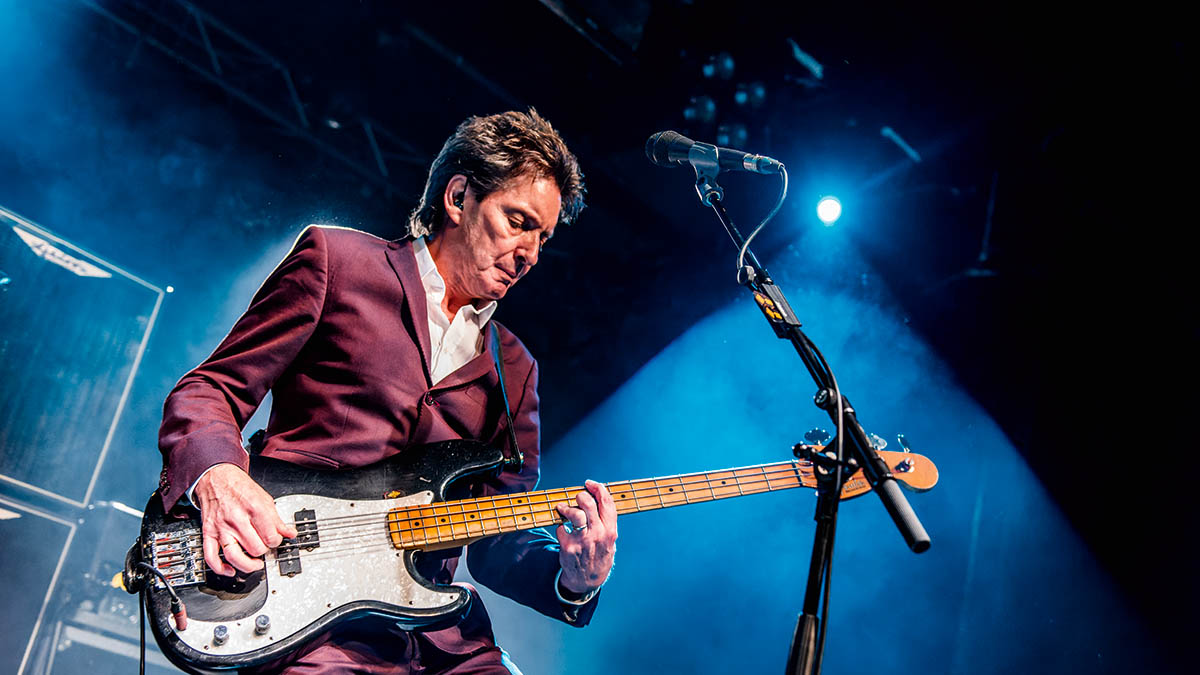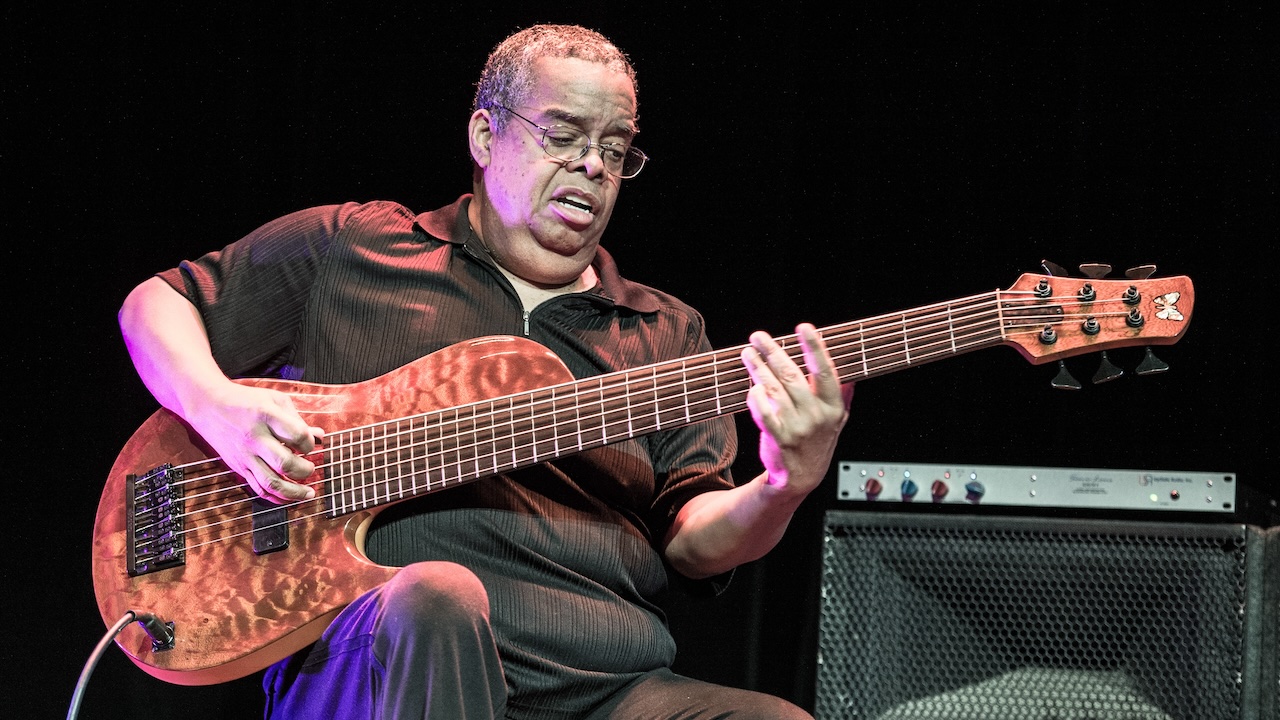Bruce Foxton: “We once butchered some Rickenbackers, putting in P-Bass pickups to make it sound like a Precision. But all it did was screw up a lovely guitar”
The former Jam bassist checks in to discuss his tonal experiments, writing with Paul Weller and why the Beatles can't sue him for the Start! bassline

All the latest guitar news, interviews, lessons, reviews, deals and more, direct to your inbox!
You are now subscribed
Your newsletter sign-up was successful
He’s the sharp-suited mod who partnered Paul Weller in The Jam and penned the best basslines in punk.
Now, as he keeps the classics alive in From The Jam and releases a fantastic new album of originals with Russell Hastings, Bruce Foxton looks back on burying the hatchet, beating tinnitus and why the Beatles can’t sue him for the Start! bassline…
When you’re young
“Most kids want to be professional footballers or firemen. I just wanted to play music and I thought guitar was a good start – the piano was a bit too big and expensive. My mum and dad, bless them, they saved up their pennies and bought me an acoustic guitar to start the ball rolling. I was a bit clumsy, just dabbling to start with. But if you want to do something good, you’ve got to do it on a regular basis. And I just went on from there.”
Trading places
“I joined The Jam as rhythm guitarist. They had a lead guitarist in Steve Brookes and Paul [Weller] was on bass. But when Steve left, we auditioned a few players and they either weren’t good musically or we’d have found them hard socially. So Paul said, ‘Let’s try it as a three-piece. You take bass, I’ll take rhythm/lead, see how we go.’ That’s how it finished up.
“I didn’t mind moving to bass. I wanted to perform live, and if that meant changing instruments, I was prepared for it. The only thing is that if you’re at a party and someone says, ‘Give us a song, Bruce,’ piano or guitar is a lot easier than bass. For me, it’d have to be the Formula 1 intro [Fleetwood Mac’s The Chain] all the time!”
Meeting the modfather
“I wouldn’t say that Paul and I immediately clicked, but he literally didn’t want to do anything at all, work-wise, other than be a successful musician, and I thought, ‘That sounds good to me.’ That’s what I wanted, to be in a band that was working.
“Paul was just very determined and committed. He could be prickly, shall we say, in interviews or whatever – and I didn’t envy your job! I think 40 years down the line, he’s probably mellowed.”
All the latest guitar news, interviews, lessons, reviews, deals and more, direct to your inbox!
Power trio
“Sometimes you get three musicians and the standard of their playing is okay, but it’s not going to set the world on fire. But when you couple, say, my bass with Rick [Buckler]’s drumming and Paul’s guitar, it was just a formula that worked. I couldn’t play slap bass.
“I’m not Mark King or one of those players, although I think there’s a couple of twangs here and there on Absolute Beginners. Each to their own. Like Stanley Clarke or whatever – I appreciate the quality of his playing, but it wouldn’t have suited The Jam, would it?”
In the city
“The working men’s clubs of Woking wasn’t really our audience, but it was like serving an apprenticeship. We knew it was time to move on when you looked out at the audience – who were pretty old in those days, and they all had their fingers in their ears, the whole venue. So we thought, ‘Hmm, they’re not really digging this, are they?’
“John Weller [Jam manager and Paul’s father], he traipsed everywhere getting work for us, borrowing and begging transport to move our gear around. He put feelers out up in town and we started getting London gigs at The Greyhound, the Red Cow and The Marquee. So we eventually cracked that circuit, which was great. A&R guys wouldn’t come out to Woking because they thought it was in the sticks.”
Anarchy in the UK
“There wasn’t a lot happening in the early 70s that appealed to younger audiences, so when punk came along it was like a breath of fresh air. We were termed as the black sheep of the punk era because we had more going for us musically, and we wore suits, not bondage trousers.
“The Jam wasn’t really a punk band. But those were the old days of pigeonholing bands, weren’t they? I’ve been guilty of it myself to a certain extent.”
Jam sessions
“With my bass influences, I go back to the ’60s, John Entwistle and Paul McCartney. Basslines like Start! just come to you. It’s not an intentional thing. Obviously, people have said that Start! sounds like Taxman.
“Well, it’s not quite like Taxman, note-wise – you couldn’t sue me for it. I think that came about because we were in the States at the time and listening to the Beatles’ Revolver album a lot, so it was probably in my head somewhere and when Paul presented me with Start!, it came out.
“The bassline for A Town Called Malice has a Motown vibe, whereas Down In The Tube Station At Midnight is quite spaced-out and goes hand in hand with the ominous lyrics. Those basslines were all just in the moment – whatever pours out.”
Precision testing
“I’ve still got my Rickenbackers from the Jam days. I love the look of a Ricky, and because the neck is so slim on a 4001, my hands could go round it quite well. But it was around about the time of All Mod Cons [1978] that I tried a Precision and just loved it. It’s just the sound of a P-Bass.
“It just had that more punchy bottom-end. I found the Ricky quite toppy. In fact, it was sacrilege, but me and my guitar tech once butchered some Rickys, putting in P-Bass pickups to try to make it sound like a Precision. But all it did was screw up a lovely guitar.
“Probably my favourite P-Bass of all was that one I used on All Mod Cons. It was a tough decision to auction that bass in 2009, but I’d enjoyed it and I wanted someone else to enjoy it – and I got a few bob for it.”
Writer blocked
“George Harrison got the hump when he left the Beatles because he said he had so many good songs that Paul and John didn’t want to know about. But I’m not comparing myself with George Harrison!
“News Of The World and Smithers-Jones are probably my finest moments in terms of having a go at songwriting in The Jam. I didn’t find it that easy, and some of the tracks that did actually make it onto vinyl, I don’t really think they warrant being there.”
End of the road
“The Jam splitting up in 1982 was a big deal. It was a very emotional time. Paul called a meeting and said he was leaving the band. Of course, we were taken aback. It was devastating at the time. It was like going out with your girlfriend for a long while and then she ditches you. I couldn’t believe it.
“And the farewell shows we did in London, they were hard. We were at the top of our game. Members of the public would come up in tears and say to me, ‘Why are you splitting up?’ And it was like, ‘Well, I don’t know, exactly.’ Paul never really gave a reason. I thought we had more in us to give, but he’d made his mind up and we had to respect that and move on.”
Freak out
“The record company were chuffed with the success of my first solo single Freak [1983], but they gave me another couple of singles and they didn’t do so well, so they dumped me, basically.
“When we were talking contracts, they said, ‘We see you as a longterm project, it’s not just a cash-in job.’ But it turned out to be that, really. They just milked what interest I might have to the public, and when that waned, they just said goodbye.”
Stiff drinks
“Joining Stiff Little Fingers in 1990 was pretty testing because Ali McMordie is a good player. But when Jake Burns told me Ali had moved on, I jumped at the chance. It was different to The Jam. There was a bit more punk in them, I suppose. I loved the songs and I knew Jake really well as a friend anyway. And I wasn’t doing a lot.
“I was dabbling with other bands, trying to make something of a career, just beavering away in the background. It was 15 years of great times – and lots of drinking. But it was a good decision to move on in 2004 and do the Casbah Club. I think we’d exhausted Fingers between us. Otherwise it might have killed me because I was drinking far too much.”
We’re jamming
“From the Jam are still flying the flag for those classic songs. There’s a wealth of material and I think it should still be heard, and the audiences all seem to have an amazing time when they come along. So that’s the mission with this band, just to enjoy it. As long as there’s a demand there, we’ll supply it.”
Friends reunited
“Guesting on Paul’s 2010 album Wake Up The Nation and appearing with him on stage at the Royal Albert Hall, that meant a lot. My first wife was seriously ill and having treatment in Tel Aviv because it was top-notch at the time. Paul called us while we were out there.
“He’d heard what was happening through a mutual friend and he was just wishing us lots of love. That just meant so much to me. Whatever we fell out about all those years ago was just pathetic compared to real, proper issues. It put it all in perspective.”
Boom boxes
“I’ve used Ashdown or Marshall amps for years. Ampeg did us proud for a while; I found they were great when they worked. But Casbah Club were on a support tour to The Who in Europe and Pino Palladino was using SVTs – and his blew up on one occasion, so he had to borrow mine!”
Having a flutter
“I’m exceptionally pleased with The Butterfly Effect, my new album with Russell Hastings. We didn’t have any set direction in our heads. It was like a raffle – we just stuck our hands into the box and come out with those tracks. The main criteria, if there was any, was melody. We had to work around Covid, so the bulk of the album was done on iPhones. Russell would call up and say, ‘I’ve got this idea for a song,’ and he’d ‘la’ [sing] it to me. Then I’d put down a guide bass, send it back to him.
“We had do a Covid test every time we went in the studio, which wasn’t really conducive to writing. But the shackles were off and we enjoyed the whole process. It’s important to show that we’re not just stuck in that Jam period, that we’re also moving forward with new material. We haven’t stagnated, put it that way.”
Sound affects
“I’d advise your readers to use in-ear monitors from the start because it takes its toll. I’ve been in the music industry 40-odd years, and a lot of that time was done without in-ears. It was just very loud monitors on stage firing up at me and, consequently, I suffered.
“Like quite a few musicians, I’ve now got hearing aids and if I’d taken more of a precaution all those years ago, I’d still have good hearing now. But that’s the price I paid for it. Eventually, I had to make a decision. If I’d just carried on at the volume we were at with the wedges, I’d probably have lost my hearing completely by now.”
Bruce almighty
“It was very flattering and nice when NME readers voted me the No 7 most influential bass player in the world. It’s nice to be thought of like that. I don’t quite understand it because I consider what I do quite easy and anybody could do it.
“But obviously not! My main hope for the future now is good health. I’ve had a scare with a lymph node being cancerous, but so far, so good, and I’m having immunotherapy treatment. So my ambition is just to stay healthy, more than the music.”
- Butterfly Effect is out now via Bass Tone Records.
Henry Yates is a freelance journalist who has written about music for titles including The Guardian, Telegraph, NME, Classic Rock, Guitarist, Total Guitar and Metal Hammer. He is the author of Walter Trout's official biography, Rescued From Reality, a talking head on Times Radio and an interviewer who has spoken to Brian May, Jimmy Page, Ozzy Osbourne, Ronnie Wood, Dave Grohl and many more. As a guitarist with three decades' experience, he mostly plays a Fender Telecaster and Gibson Les Paul.








